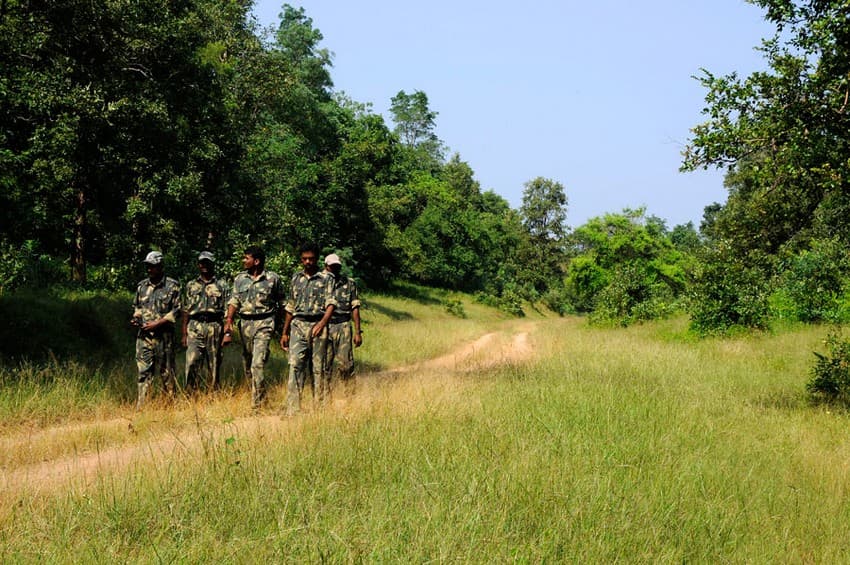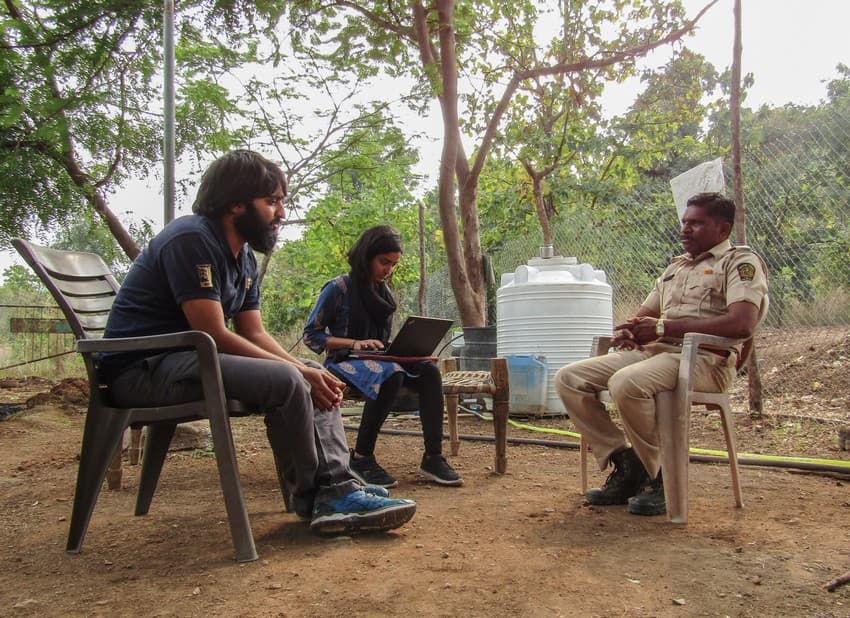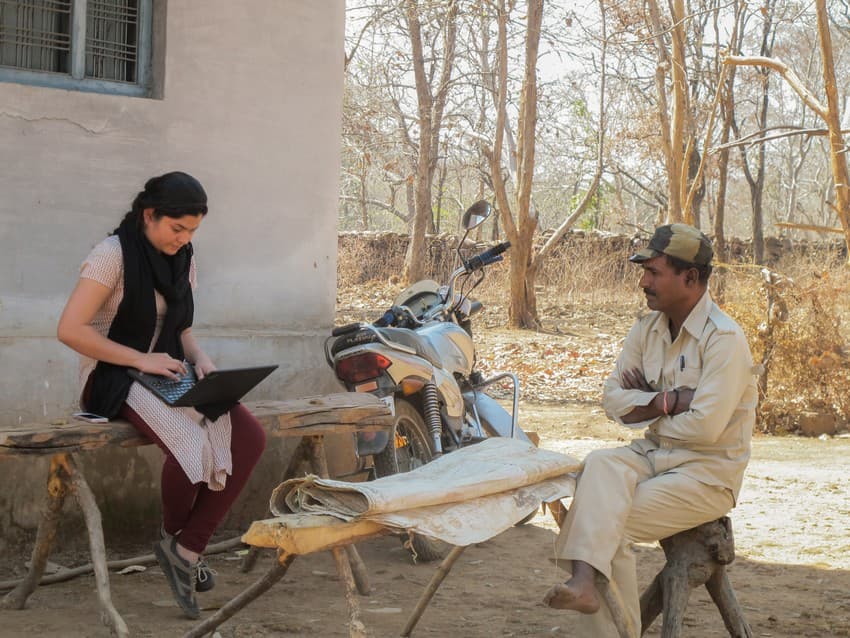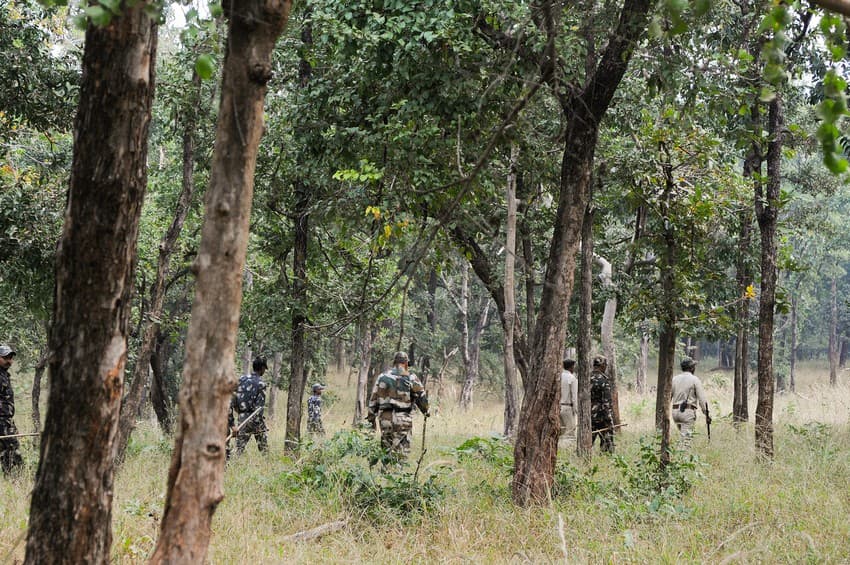Small protection huts, better known as anti-poaching camps (APCs), dot the tiger reserves across India. Men and women in uniforms keep flitting in and out of these camps. There are rangers, other senior forest officials, forest guards and special tiger protection squad. It is the lot of forest guards in particular which has our attention. The ‘lowest’ in the rung of forest services, the forest guards make up the first line of defence against anthropocentric threats. They perform the invaluable service of protecting the life-giving ecosystems such as forests, rivers, wetlands among others, and the wildlife and a host of other natural resources that lie within.

Forest guards perform the invaluable service of protecting the life-giving ecosystems such as forests, the wildlife, and a host of other natural resources that lie within. Photo: Anish Andheria
WCT is striving to learn about the real persons behind these uniforms that are donned so proudly. Often a uniform tends to render the person behind it invisible. Only their duty defines them. We forget, or rather neglect the intelligent, aspiring, sensitive humans behind the cloak of uniforms. With environment and nature conservation featuring worryingly low in the list of priorities of the state, the people employed in forest management sectors aren’t given the acknowledgement and care they deserve. And forest guards, hardly ever so.
WCT, which has been a staunch advocate for the well-being of forest guards for over a decade now, has admittedly, so far missed the psychological link towards achieving this holistically. Our focus has been largely on improving their work conditions by donating necessities such as winter gear, vehicles, water purifiers, digital cameras, walkie-talkies, etc., conducting heath check-ups and strengthening protection mechanism by providing training in law enforcement and forensics. Applying psychology as a tool for conservation was still to be introduced into our agenda. But soon, it was clear, that it is exceedingly important to determine the mental health and work motivation levels, since a motivated staff is critical to the protection of our forests.
In today’s age, forests take managing. Forest protection mechanisms involve intricate management interventions to deal with myriad pressures on and overexploitation of the forest’s limited resources. It ranges from physical protection measures; to human-wildlife interface management; to water and soil conservation measures; fire control and everything in between. The majority of the onus to implement these efforts on ground falls onto the shoulders of the forest guards. A forest guard’s job is extremely challenging, both physically and psychologically. According to the Maharashtra Forest Manual (Volume 2011), a forest guard’s duties include tasks such as foot patrolling (average weekly target being 35-45 km.), monitoring wildlife populations, water resource management, drawing and maintaining fire lines, fighting forest fires, handling human-wildlife interface (which if not tackled in time, escalates into conflict between people and wildlife), paving and building of navigable roads within the tiger reserves and keeping a check on intrusions and illegal activities, investigating wildlife crimes… and the list goes on. The forest guards in tiger reserves are expected to reside in modestly-equipped protection huts, usually situated kilometres away from the faintest hints of civilisation. One to three daily wage workers are assigned to each guard. But apart from that, they remain deprived of familial human contact.
It is important to think about all that goes into making a good employee tick. It is a sum of conducive environment that ensures good working conditions and tangible benefits, and also the one that fosters a worker’s psychological well-being. Unfortunately, apathetic work and living conditions of India’s forest guards, is one of the main reasons for poor work motivation. And the effects of these inevitably trickle down to the quality of protection of our forests and law enforcement. Productivity and efficacy are directly proportional to good working and living conditions, and this has time and again been affirmed by extensive psychological and social studies. A scientific paper authored by social scientists Deci E.L. and Ryan R.M. in 2014, which focused on the importance of universal psychological needs for understanding motivation in workplaces, argued that “human beings have deeply evolved psychological needs to be competent, autonomous, and related to others, such that, in contexts, where these needs are satisfied, people evidence more volitional, high-quality motivation and greater well-being, and when these psychological needs are thwarted, people display various forms of diminished motivation and more symptoms of ill-being.”
It was time for WCT to take concrete steps to understand what their job means to the forest guards, to take stock of their work morale, systematically and scientifically. Though, in the past, there have been surveys and studies done on the forest rangers and workers in Asia, including India, studies focusing on their psychological, motivational and work performance are too few and far in between. WCT’s committed team of social scientists have set out to address this shortcoming and are in the process of conducting studies to assess the work motivational levels of forest guards stationed in all tiger reserves of Maharashtra and Madhya Pradesh.
A meticulous psychology survey was designed by a team of psychologists including Dr. Vivek Belhekar, Professor, Dept. of Applied Psychology, University of Mumbai; Aniket Bhatkhande, Conservation Economist, WCT; and Rushikesh Chavan, Head, Conservation Behaviour, WCT, all of whom put their heads together focused on getting important and optimal data, keeping in mind the sensitivity of engaging with the forest guards.

WCT social scientists engage in an interview with a forest guard in Melghat Tiger Reserve, at one of the Anti-poaching Camps. Photo: Purva Variyar
“Work motivation is so important for efficient work performance and satisfaction. We have sampled about 40% of forest guards from every range, in 11 tiger reserves and one wildlife sanctuary across Madhya Pradesh and Maharashtra so far. Each forest guard is assured of strict confidentiality and that helped to put them at ease, explains Prachi Paranjype, who is perhaps India’s first professional Conservation Psychologist in her own right. She is part of WCT’s Conservation Behaviour team and is leading this study.
The team has been tirelessly visiting forest guards in APCs across tiger reserves to interview them, as it is absolutely necessary that the forest guards are in an environment they prefer so as to have an open and honest chat with the interviewer. About, 440 forest guards have been interviewed thus far. The goal is to translate the emerging findings into meaningful policy level interventions that focus on improving the working and living conditions of the forest guards.

WCT Conservation psychologist, Prachi Paranjype, interviews a forest guard at an anti-poaching camp as part of the forest guard survey. Photo: Wildlife Conservation Trust
The findings that emerged from the studies feature in two detailed reports1. In Madhya Pradesh, the degree of factors, namely, ‘work satisfaction and well-being’, and ‘association with work’ among the field staff, varied from one tiger reserve to another. If Kanha and Bandhavgarh were high on ‘association with work’, they were low on ‘work satisfaction and well-being’. Vice-versa for Satpura, Pench and Sanjay-Dubri tiger reserves. So while the former two risked an increased instance of burn-out, the latter three indicated performance issues among the field staff. Similarly, in Maharashtra, three factors stood out – ‘sense of achievement’, ‘work conditions’ and ‘perception of policy’. The findings pointed to the forest guards exhibiting fear and worry for their safety and security, which was hampering their motivation.
Interestingly, whilst interviewing and interacting with the forest guards, and having promised them the luxury of confidentiality, several of them felt confident and comfortable enough to open their hearts out. While some expressed their appreciation of the opportunity to work in forests they cared about and respected, some put forth their angst of working in relative isolation, while some revealed their worries about their families owing to long separation periods, low pay and lack of family welfare policies, while others shared their qualms about the lack of communication and feedback from their superiors. In their moments of vulnerability, we were granted a glimpse into the deeper reaches of their heartfelt concerns and apprehensions.
One thing was clear – though the present study is focused on assessing the work motivation levels, a deeper intervention in the form of prioritising psychological health of the field staff is much needed.
Based on the analysis of the data collected so far, WCT has zeroed down on several policy and management recommendations for the states of Maharashtra and Madhya Pradesh. The recommendations are specific and clear. Some of the suggestions made are to improve the conditions of anti-poaching camps; instil a sense of achievement among forest guards; organise training sessions for higher level forest officials in human resource management; conduct safety training for forest guards; set up medical and counselling facilities; and offer specifically designed financial incentives. Each one of those suggestions come accompanied with specific and clear-cut instructions for policy makers to implement. Implementation and enforcement of these would be nothing short of revolutionary. Albeit, keen and pragmatic political will is of the essence.

It is exceedingly important to determine the mental health and work motivation levels of the forest guards, since a motivated staff is critical to the protection of our forests. Photo: Anish Andheria
“Nothing can improve in isolation, understanding forest guards’ motivation levels helps us to make recommendation on how the efficacy and efficiency of forest department, especially in tiger reserves, can be improved. This study has allowed us to make policy recommendations and interventions in Maharashtra and Madhya Pradesh. I am satisfied that the efforts have been well received by both Forest departments. But our work does not stop here,” says Rushikesh Chavan, who heads the Conservation Behaviour team at WCT.
The change needs to stem as much from bottom up as from top down and “every other direction” as Chavan puts it, for any permanent change to get firmly embedded in the system. Human resource management practices need to evolve and be internalised as part of the Forest Department ethos. This demands behavioural change, which WCT’s conservation psychology interventions hope to effect. To this end, after a detailed consultation with the Chief Wildlife Warden and Field Directors of the concerned tiger reserves of both states, WCT has started administering specialised workshops for the Range Forest Officers (RFOs) and Assistant Conservators of Forests (ACFs). This is an attempt to educate and instil a culture of sound and ethical human resource management practices and equip the department with the right tools. It is important that the higher ups in the forest service chain of command invest in boosting and retaining the morale of those working under them.
As succinctly narrated by Dr. Anish Andheria, “The forest department’s work is on par with the police and armed forces. They risk their lives everyday working in difficult terrains and braving myriad hostile elements – poachers, encroachers, smugglers, mafias, human-wildlife conflict, health hazards in the form of water-borne diseases, forest fires and of course, accidental deaths by wild animals.” To further elaborate on just how dangerous the job of a forest guard is, especially in India, a look at the report2 by IndiaSpend indicates that India has seen more frontline forest staff deaths than any other country in the world between 2012 and 2017. Of the global figure of 526 ranger deaths, 162 (31%) were recorded in India. The high-risk job of a forest guard demands extreme personal sacrifices. And yet, only a few know of their valour and hard work. Only a few realise the true significance of what they do. They are essentially working to secure our food, water, air and economic security. But they get lost in the quagmire of a thankless 24×7 job, with no perks, negligible salaries, lack of even the most basic facilities, and worse – isolation and apathy. Yet, they march on.
On a misty, cool morning, deep inside the undulating forest of Melghat Tiger Reserve, we sit down with a forest guard in a protection hut. We are almost about to conclude the interview when, the visibly moved guard says, “This is the first time someone has shown any interest in knowing how we feel and what we go through in the rigours of our job as forest guards. Only thing conveyed to us are orders. This is different.”
1The two study reports titled ‘Assessing the Work Motivation of Forest Guards’ for Madhya Pradesh and Maharashtra are available to read here.
2https://archive.indiaspend.com/wp-content/uploads/1.-2016_2017-Honour-Roll.pdf
——————————————————————————————————————————————————————
About the Author: Purva Variyar is a conservation and science writer at the Wildlife Conservation Trust, India.
——————————————————————————————————————————————————————
Disclaimer: The author is associated with Wildlife Conservation Trust. The views and opinions expressed in the article are her own and do not necessarily reflect the views and opinions of Wildlife Conservation Trust.
Related Links
- Human Wildlife Interface Management
- Connectivity Conservation
- In Hostile Territory
- Donors
- About Us
- Wildlife Population Estimation
- A Thousand Voices from the Field
- Poaching and trade of jackals rampant: Study
